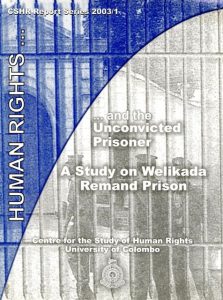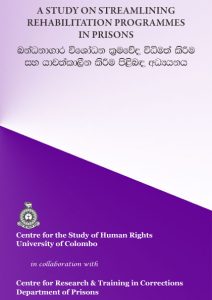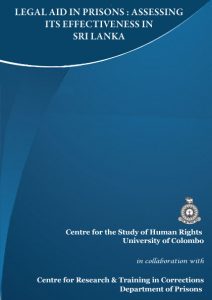The government should solve violations and other problems before situations worsen. If the State has a genuine interest in the situation of prisons, it can be solved. The Prison Ordinance does not contain sufficient measures to overcome problems in prison. Furthermore, women inmates, especially expectant mothers should have better facilities and treatment in order to meet their special needs.
The majority of remand prisoners complain of the excessive length of custody in remand, as being aggravated by the slowness of Police investigations and the shortage of judicial officials. In our view, international standards should also be incorporated into domestic law, as well as having training programmes and implementing policies for personnel wherever appropriate.
CSHR conducted this research to understand the compliance of prison authorities to human rights, with regard to remand (or un-convicted) prisoners. Undergraduate law students were trained as interviewers and 150 remandees (both male and female) were interviewed for the research in Welikada prison. The research examined the causes and nature of the offences committed by remandees, how remandees are penalized for their crimes, identify the facilities required by remandees and the extent to which they are utilized, gauge the level of human rights awareness among remandees and prison officers, gauge the level of awareness of related laws among prison officers, and to identify methods of promoting awareness of human rights and related laws among prison officers.
The research concludes that the Sri Lankan Constitution and the judiciary have generated important jurisprudence in relation to the application of international standards in Sri Lanka, especially for remand prisoners. They should be made available in an accessible form to all State institutions that are responsible for protecting prisoners’ rights, to prevent violations from taking place there.

CSHR conducted this research in collaboration with the Center for Research and Training in Corrections (CRTC), Department of Prisons, Sri Lanka in 2012 with funding from the Access to Justice Project of the UNDP. CSHR extended its academic support to re-establish the Research Unit of the CRTC trained prison officers on Research Methodology and capacitated them to undertake research of their own.
The objectives of the study were to conduct a study on how far up to-date the corrections programs were, to provide suggestions to streamline them, and to provide educational guidance and assistance needed for the research, and to train the prison officials in research so as to expand the research unit by capacitating prison officials on research.

The research was carried out in Anuradhapura, Batticaloa, Mahara, Weerawila, and Ambepussa (youthful offenders) with 150 inmates (both male and female) and 42 prison officers, using structured and semi-structured interviews and a literature survey. The study recommends the following to the policy makers and legislators: update the existing laws and regulations so as to benefit the current correction process; reduce the congestion within prisons; allocate sufficient financial, physical and human resources for correctional process; maintain a ‘correctional-friendly’ architecture within the prisons/construction of buildings and creation of the physical environment appealing to the correction process; recruit counselors to the permanent staff of the prison; and establishing open prison camps for female prisoners. The study recommends to the Department of Prisons and its officers the following: using new technology and teaching methodology for correction programmes in social, economic, religious and educational rehabilitation; combining isolated correctional programmes in order to create a regular, single process of correction; correction programmes focusing on personal development; reactivating the home leave and after care system to enhance the correction programme; creating an awareness in the society on the correctional process; and training prison officers emphasizing their responsibility in the correction of prisoners.
CSHR conducted this research in collaboration with the Center for Research and Training in Corrections (CRTC), Department of Prisons, Sri Lanka in 2012. The objective of the study was to assess the effectiveness of legal aid programmes in prisons, to understand whether inmates were satisfied with the legal aid that they received, what issues were faced by the prison officers when organizing legal aid clinics, and what procedures are followed by the governmental and non-governmental organizations in providing legal aid. Fieldwork was carried out in Welikada, Colombo Remand Prison, Kalutara, Mahara, Negombo, and Magazine Prison with the participation of 105 inmates (male and female), 24 prison officers, and 07 legal aid providers and funders.
The research makes several recommendations to law and policy-making bodies:
- Amendments in relation to Prison Ordinance No 16 of 1877 to be in line with international human rights conventions, Standard Minimum Rules for the Treatment of Prisoners, and the standards of all international conventions in relation to juvenile justice, and the 1978 Constitution of Sri Lanka to be brought in compatible with the International Convention on Civil and Political Rights Act.
- Relevant amendments to the law to be made to expand the discretionary powers of Magistrates in relation to Non-Bailable Offences.
- To have effective coordination among institutions that are directly involved in the criminal justice system.
The study recommends to the Department of Prisons the following:
- To incorporate Legal Aid services into the Prison system and to make it the relevant officers’ duty and obligation.
- To make all prison officers aware of the right to legal support, that it is protected by the Constitution as a fundamental human right, that it is a responsibility of officers and (to make them aware) of legal aid services.
- To document information on the legal aid clinics in relevant prisons, on inmates who participated, and on the progress of the clinics.
- To provide remandees with a handbook or leaflets on legal aid services at the time of imprisonment.
It recommends to the Legal Aid providers the following:
- To provide the Department of Prisons with information on the organization’s constitution, and main policies, to avoid the participation of those who are not able to obtain legal aid.
- To make relevant prison officers and inmates aware of the progress made on the case.
- To have a post-evaluation system on the progress of legal aid programmes and to maintain a database.
- Legal aid organizations to obtain the support of experienced senior lawyers.

The Doctrine of Command Responsibility is not a novel concept in Sri Lanka. The Final Report of the Commission of Inquiry into Involuntary Removal or Disappearance of Persons, in Section IV addressing Legal Proceedings that need to be made, stresses that the chain-of-command responsibility has already been identified and its implications worked out in the Habeas Corpus Jurisdiction of the Court of Appeal. The Commission recommends that the issue of accountability of the chain-of-command structures be referred to the Supreme Court under the constitutional provisions of Article 129 which enables the President to seek the option of the Supreme Court where it appears to the President that a question of law or fact has arisen which is of such nature of such public importance that it is expedient to obtain the opinion of the Supreme Court.
This research aimed to further strengthen the discussions for the adoption of a clear and precise definition, which incorporates the Doctrine of Command Responsibility in local legislation. It is also hoped that superior officers will strengthen their efforts in having effective control over their troops, in order to avoid bearing the responsibility for their troops’ wrongs. It is imperative that we review and reform existing laws in order to address the most heinous, but soon becoming common crimes in our country and rule out impunity at every level.